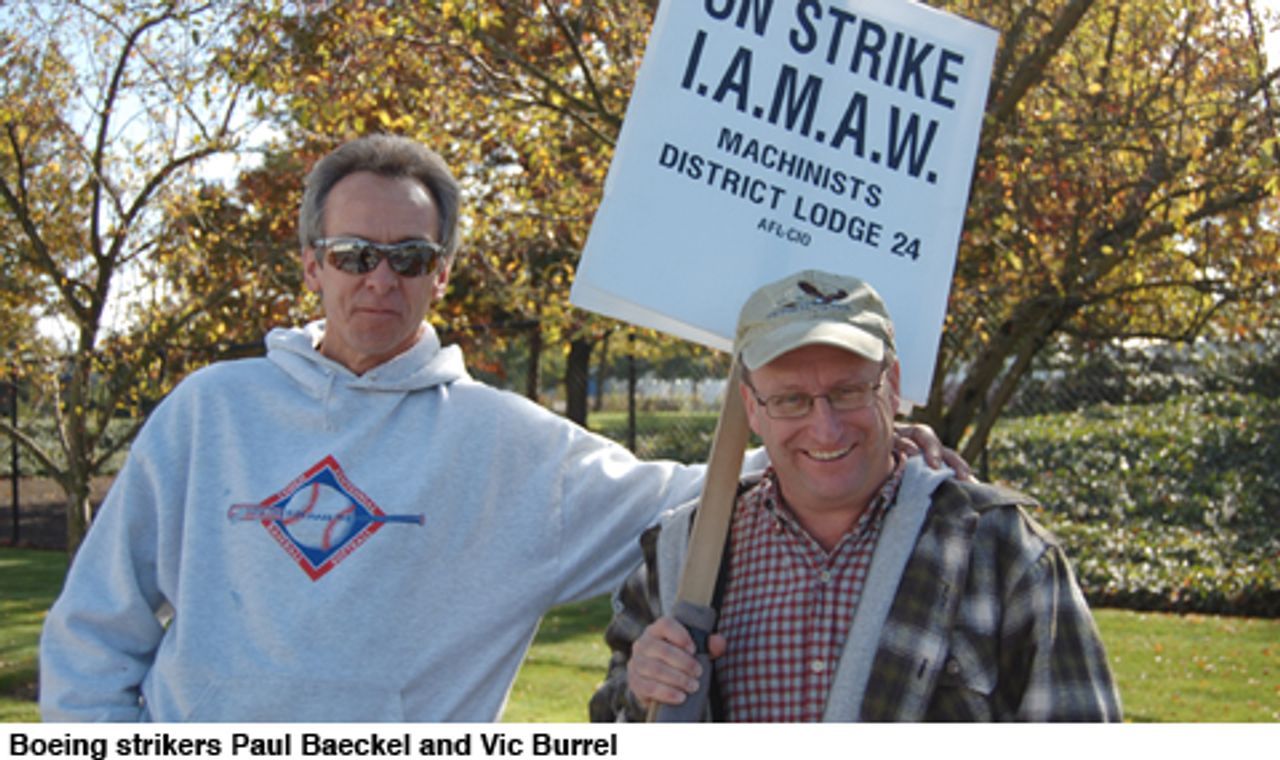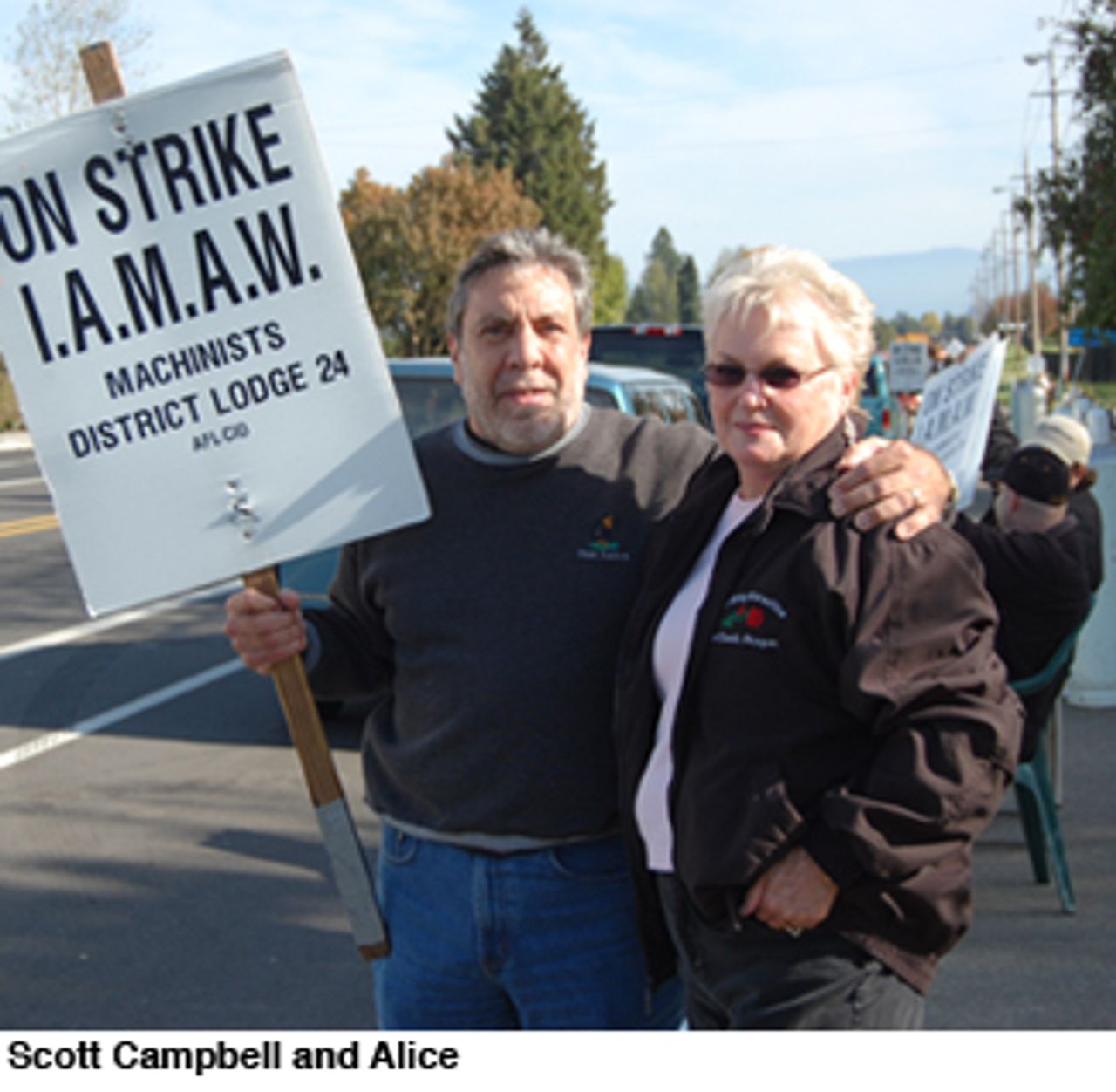The International Association of Machinists and Aerospace Workers (IAM) signed a tentative contract with Boeing Monday night that represents a betrayal of the workers' seven-week strike against outsourcing and the destruction of union members' jobs.
 Some 27,000 workers have been on strike since September 6 against the giant airplane manufacturer, shutting down plants in Washington state, Oregon and Kansas. The key issue in the contract struggle is the outsourcing of jobs to nonunion companies.
Some 27,000 workers have been on strike since September 6 against the giant airplane manufacturer, shutting down plants in Washington state, Oregon and Kansas. The key issue in the contract struggle is the outsourcing of jobs to nonunion companies.
IAM District 751 posted a statement on its web site Monday night announcing that contract ratification votes would be held within three to five days.
The tentative agreement does nothing to limit the company's ability to continue slashing jobs at its facilities by farming out work to low-wage vendors. A focal point in the dispute over this issue is the role of New Breed Logistics, a non-union company based in North Carolina, with which Boeing has contracted to produce components for the airplane maker's new 787 Dreamliner aircraft.
In 2002, the union caved in to company demands to allow outside vendors, such as New Breed, to deliver parts directly to Boeing's jet assembly lines. That concession threatens the jobs of some 2,000 Machinists who receive parts or tools and deliver them to the factory floor for assembly. In calling for a rejection of the company's last offer in September, the union demanded that the 2002 concession be reversed so that only union members could handle components from outside vendors.
However, in the tentative agreement reached Monday, the union backed down and accepted a provision that allows Boeing to expand the delivery of components to its plants by outside vendors such as New Breed. Under the agreement, contractors will deliver parts to factory receiving areas, rather than directly to the assembly line. This so-called "compromise" will undoubtedly result in layoffs among union workers involved in the handling and delivery of components.
More fundamentally, the agreement does not challenge the company's overall use of nonunion contractors.
In a further major concession, the union agreed to a four-year contract, instead of the traditional three-year agreement. According to press reports and the union web site, the contract provides for wage increases totaling 15 percent over the four-year term of the agreement. This represents a retreat from the union's wage demand in advance of the strike. At that time, the IAM demanded a 13 percent wage increase over three years, already an insufficient rise to make up for inflation.
The tentative contract also includes bonuses for workers over the four years totaling at least $8,000.
The statement posted on the union web site acknowledged that the contract contains "work rule changes designed to improve productivity," another giveback to management that will be used to impose speedup and eliminate jobs.
Boeing reportedly backed away from demands that union members assume a larger share of their health care costs, agreeing to lock in the previous medical plan for the life of the new contract.
This retreat by the company is a testament to the crippling impact of the strike on its current profits, its stock price, its production schedule and its future prospects. According to company spokesmen, the strike has cost Boeing $100 million a day, or more than $5 billion, and caused delays on production lines that will take weeks or months to sort out. Its impact has been particularly damaging in relation to the company's strategic 787 project, which already suffered numerous delays before the onset of the work stoppage.
Boeing's first quarterly report since the beginning of the strike showed an earnings drop of 38 percent. Net income fell to $695 million compared to $1.1 billion in the same period a year ago. The company reported a negative operating cash flow of $442 million for the quarter. The strike prevented the delivery of 35 airplanes over the period.
The strike's impact has been compounded by the financial panic that erupted only days after the walkout began. A Goldman Sachs analyst predicted this week that the impact of the financial crisis will force Boeing to slash deliveries in 2010. "We believe that the inability to obtain financing will cause customers to defer or cancel orders," Richard Safran wrote in a letter to clients.
The company's share price fell from about $63 at the start of the strike to $42.36 at the close of trading in New York on Monday. Wall Street's verdict on the tentative contract was reflected in a sharp rise in Boeing stock on Tuesday. It shot up $6.55, an increase of more than 15 percent.
The tentative deal was brokered by the government, which intervened last week through the Federal Mediation and Conciliation Service to restart talks and move them to Washington DC. According to the October 21 online issue of BusinessWeek, the reconvening of talks by the FMCS indicated that "Washington is getting nervous about the economic impact of the machinists' strike."
Clearly, the workers were in a strong position when the IAM came to the aid of Boeing to impose a contract largely on the company's terms. The sellout agreement, moreover, sets the stage for a major cost-cutting and job-slashing drive by the aircraft maker. As Goldman Sachs analyst Safran told his clients, "We believe [Boeing] will lower production rates."
The IAM, predictably, declared the agreement a victory for the workers. Tom Wroblewski, president of IAM District 751, said the union gained "important and substantial improvements" over Boeing's previous offer, and declared that the workers had won a battle "against more than just Boeing, but against corporate America."
Wroblewski had adopted a markedly different tone after Boeing released its dismal third quarter results, declaring that "partnering with the union for the future is the best way to ensure success."
Boeing Commercial Airplanes President Scott Carson made clear that the tentative agreement incorporated the company's basic demands, calling it "an outstanding offer that rewards employees for their contributions to our success while preserving our ability to compete." He added that it "provides Boeing with the flexibility we need to manage our business."
The World Socialist Web Site spoke with Boeing strikers at the Gresham, Oregon plant over the weekend, prior to the announcement of the tentative contract.
Paul Baeckel and Vic Burrell were picketing together when WSWS reporters arrived. Paul has worked at Boeing for 24 years while Vic has been there for 30.
 On the issue of globalization and the financial crisis, Vic said, "The three major auto producers in this country have all known that things needed to change. They put all their eggs in one basket with the SUVs. Automakers were putting out vehicles that got seven miles to the gallon, and now gas is going for four dollars a gallon. People aren't buying. In Europe, the companies were producing small cars."
On the issue of globalization and the financial crisis, Vic said, "The three major auto producers in this country have all known that things needed to change. They put all their eggs in one basket with the SUVs. Automakers were putting out vehicles that got seven miles to the gallon, and now gas is going for four dollars a gallon. People aren't buying. In Europe, the companies were producing small cars."
Paul added, "There is a whole change in the economy. Used to be that industry was 30 percent of the gross domestic product, now we are under 15 percent." On the government bailout of insurance giant AIG, he said, "We see them bailed out and not even two weeks later they spend $400,000 for a great little trip."
 Tom Tucker said, "I started at Boeing ten years ago, but I have only been with the company five, since they don't count the time that you have been laid off. It's pretty much like having a temporary workforce. After a layoff I got a degree from the community college. The same day that I got the recall notice from Boeing, I got an offer to work at an insurance company. I have triplets, so my wife said I had to go back to Boeing because the benefits are better. I have been back for a year. I can't afford to buy a new car.
Tom Tucker said, "I started at Boeing ten years ago, but I have only been with the company five, since they don't count the time that you have been laid off. It's pretty much like having a temporary workforce. After a layoff I got a degree from the community college. The same day that I got the recall notice from Boeing, I got an offer to work at an insurance company. I have triplets, so my wife said I had to go back to Boeing because the benefits are better. I have been back for a year. I can't afford to buy a new car.
"I think Boeing should be a little more thankful to us because we do give up a lot of our lives in their factory. We make their airplanes and we make their wealth. Now can't they share it."
Scott Campbell was on the picket line with his wife Alice. "I have worked at Boeing since 1988," he said, "and have been laid off twice and been on strike three times. So I have probably actually worked a total of 14 years. I don't think anyone wins when there is a strike, either way. Our medical insurance ended the end of the first month."
On the financial crisis, Scott said, "They're giving the money to the wrong people. I don't agree with the bailout. I think they should have bailed out the people instead of the banks and Wall Street. The people are the ones that make the economy."
Click here to download this article in PDF.
